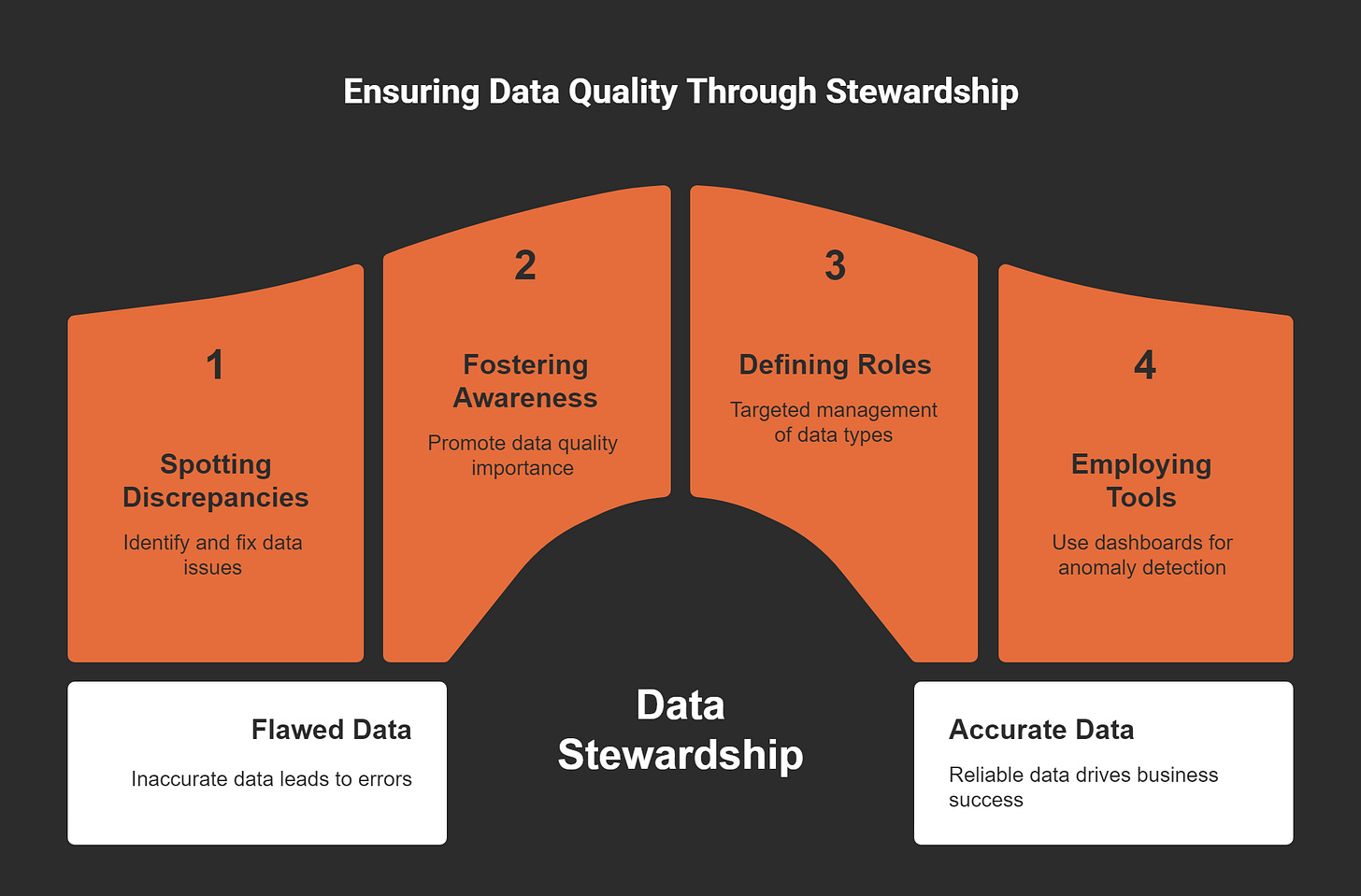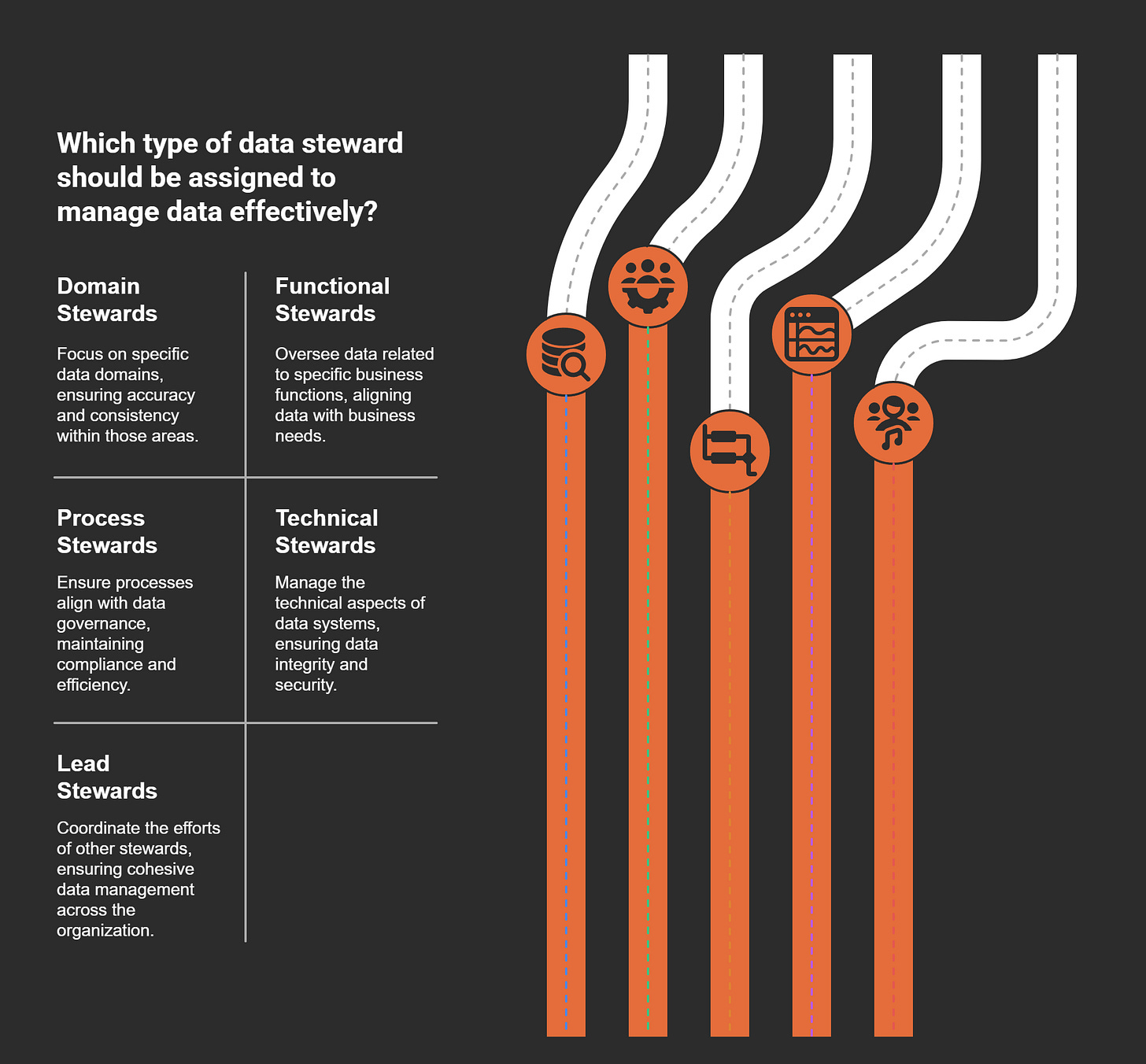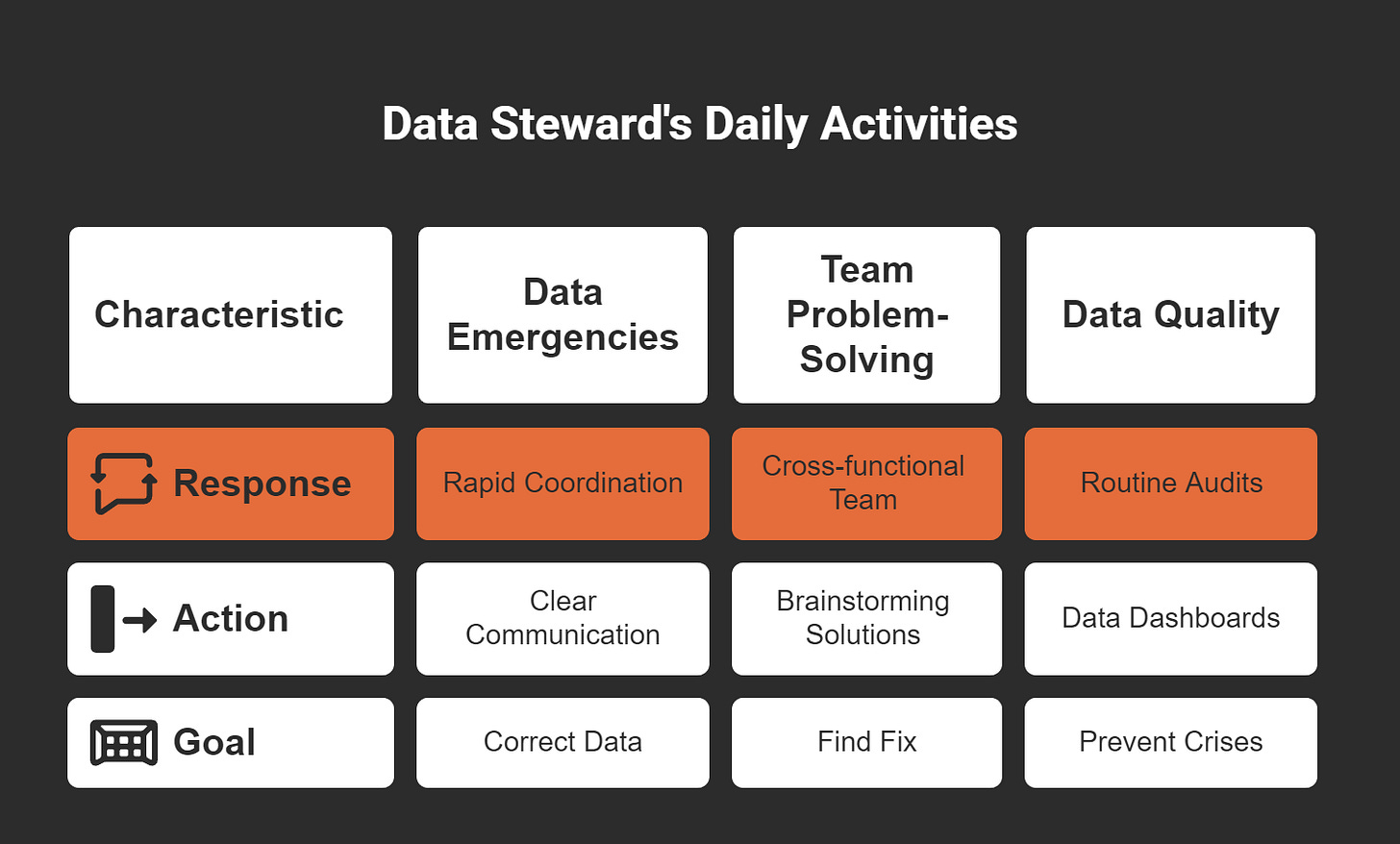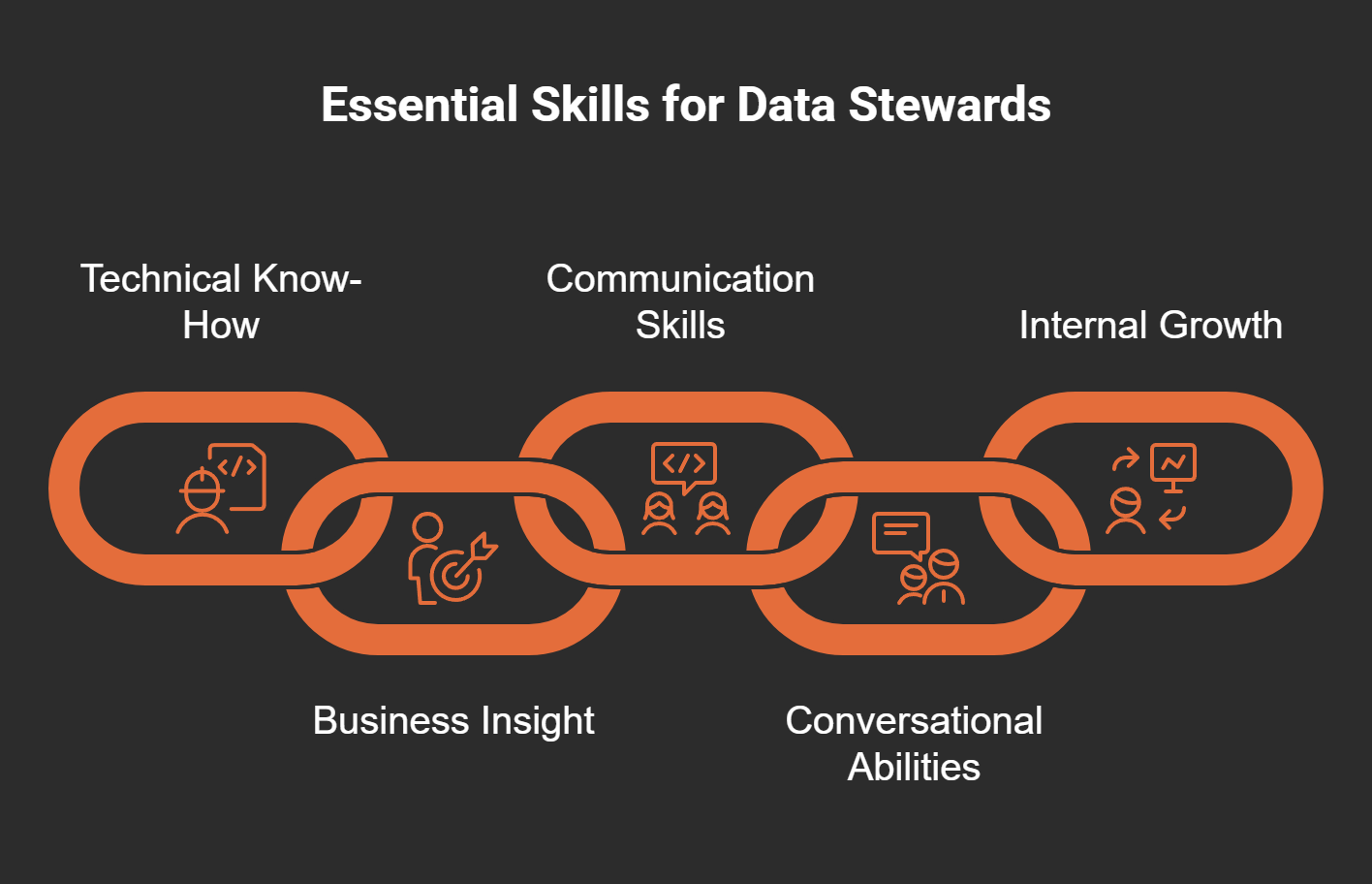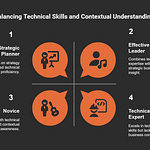As I reflect on my journey through the realm of data management, I can't help but marvel at the pivotal role played by data stewards. These unsung heroes often work behind the scenes to ensure data integrity and prevent costly mistakes. Take, for instance, a luxury automotive campaign gone awry due to flawed customer segmentation—a million-dollar blunder that underscores the importance of diligent data oversight. The story goes beyond mere numbers; it’s a narrative of trust, accountability, and the essence of sound decision-making.
The Detective Work of Data Stewards
When we think about data management, we often overlook a vital group of professionals: the data stewards. They serve as the detectives in the realm of data quality. Their work is crucial to ensuring that data discrepancies are identified before they can negatively influence business decisions.
Spotting Data Discrepancies
Have you ever wondered what happens when data isn't accurate? Imagine launching a marketing campaign that costs over $1.2 million but fails because the target audience was misidentified. This is exactly what happened to a luxury automotive brand, which experienced a significant campaign blunder. They had high hopes for a $4.8 million revenue forecast, but due to flawed customer segmentation, they missed the mark entirely. This situation underscores how critical it is for data stewards to step in and spot inconsistencies before they escalate.
Data stewards act proactively. They don't just wait for problems to arise; they actively look for discrepancies. Here are some common issues they tackle:
Duplicate records
Inconsistent tagging protocols
Outdated information
By addressing these issues early, data stewards can help prevent costly errors that might otherwise drain resources and erode customer trust.
Fostering a Culture of Awareness
One of the roles of data stewards is to promote awareness of data quality issues across departments. But how do they achieve this? They cultivate a culture of continuous improvement. After all, data quality isn't just a technical issue; it's a business imperative. It’s about getting everyone on the same page. When various departments understand the importance of data integrity, they can collaborate more effectively. This can lead to better decision-making and improved operational outcomes.
As a data steward, I’ve seen firsthand how critical it is to engage with different teams. When data quality is prioritized, organizations can reduce data-related incidents by as much as 70% and resolve issues 68% faster compared to those without strong data stewardship practices.
The Role of Data Stewardship
In my experience, data stewards come in various forms. We can categorize them into five distinct types:
Domain Stewards – Focus on specific data domains.
Functional Stewards – Oversee data related to specific business functions.
Process Stewards – Ensure processes align with data governance.
Technical Stewards – Manage the technical aspects of data systems.
Lead Stewards – Coordinate the efforts of other stewards.
This segmentation is essential because it allows for targeted management of different data types. Each steward plays a unique role, ensuring that data is accurate, consistent, and usable across the organization.
Innovative Tools and Approaches
Data quality management isn't just about identifying problems; it's also about using the right tools. Data stewards often employ data profiling and quality monitoring dashboards. These technologies help pinpoint anomalies and prevent data degradation. Additionally, strong metadata management practices enable effective tracking of data lineage and establish a common language across departments.
Have you ever thought about how much data can influence your business decisions? As a data expert rightly pointed out,
"The quality of your data ultimately dictates the quality of your business decisions."
This statement speaks volumes about the importance of having dedicated data stewards who can navigate the complexities of data management.
In the rapidly changing landscape of business, the role of data stewards has never been more crucial. They are not just guardians of data; they are champions of quality. As organizations face challenges related to data integrity, the work of these professionals will continue to evolve, ensuring that data serves its rightful purpose in driving business success.
Understanding the Types of Data Stewards
Data stewardship is an often overlooked yet vital part of data management. As we dive into this topic, it’s essential to recognize the different types of data stewards. Each type brings unique strengths to the table, contributing to effective data governance across organizations.
Categorization of Data Stewards
Data stewards can be categorized into five primary types:
Domain Stewards: These professionals focus on specific areas of data, ensuring consistency and accuracy in customer data, for example. They act as guardians of data quality in their domains.
Functional Stewards: They work closely with specific business functions. Their goal is to ensure the data aligns with the needs of that particular area, making sure all departments have the information they need for decision-making.
Process Stewards: These stewards manage the flow of data through various processes. They ensure that data is collected, stored, and utilized properly, maintaining its integrity throughout its lifecycle.
Technical Stewards: They focus on the technical aspects of data management. This includes database management, data architecture, and the tools used for data governance. They ensure that the systems in place are effective and efficient.
Lead Stewards: These individuals take on a leadership role, guiding the overall data governance strategy. They coordinate between the different types of stewards, ensuring a cohesive approach to data management.
Unique Contributions to Data Governance
Each type of data steward plays a critical role in the governance framework. They contribute in the following ways:
Domain Stewards ensure that the data used is reliable and accurate, which is crucial for trust in business decisions.
Functional Stewards bridge gaps between departments, ensuring that data serves its purpose effectively.
Process Stewards maintain the quality of data throughout its lifecycle, preventing issues that could arise from poor data handling.
Technical Stewards provide the necessary technological support, ensuring systems run smoothly and data is accessible when needed.
Lead Stewards create a unified strategy, aligning the various stewards towards common goals and ensuring that everyone is on the same page.
As I reflect on these roles, I can’t help but think of how they overlap and support one another. For example, a domain steward may identify an issue with customer data that a functional steward needs to address in their department. This interconnected web of governance helps maintain data quality across the board.
The Importance of Collaboration
Data stewards don’t work in isolation. Their collaboration is key to a successful data governance strategy. They must communicate effectively, share insights, and address issues together. This teamwork allows organizations to mitigate risks associated with poor data quality.
Consider this: “In a world driven by data, a cohesive team of data stewards makes all the difference.” - Industry Analyst. This quote encapsulates the essence of what data stewards do. Their combined efforts lead to better data management and, ultimately, more informed business decisions.
Benefits of Tailored Stewardship Approaches
Organizations benefit immensely from tailored stewardship approaches. By segmenting responsibilities, organizations can focus on specific areas of data management. This specialization ensures that each aspect of data is handled by experts who understand the nuances of their respective fields.
As we explore the world of data stewardship, it becomes clear that effective governance requires a multifaceted approach. Each type of data steward plays a distinct role, yet together they create a robust framework that supports data quality and reliability.
In the end, recognizing the unique contributions of each type of data steward can help organizations tailor their strategies for better results. After all, data is an invaluable asset, and its management deserves the utmost attention.
A Day in the Life of a Data Steward
Being a data steward is more than just managing data; it’s about navigating challenges and solving problems on a daily basis. I often find myself in situations where data emergencies arise, and it's during these moments that the true value of data stewardship shines through. So, what exactly does a day look like for someone like me? Let's break it down.
Challenges Faced During Data Emergencies
Data emergencies can strike at any moment. Whether it’s a significant drop in data accuracy or a sudden spike in erroneous entries, the stakes are high. I remember a time when our customer segmentation data was severely flawed. A high-stakes marketing campaign was on the line, and we had to act quickly. The challenge? Correcting the data without disrupting the ongoing operations.
Rapid Response: In such situations, being quick and effective is crucial. I often coordinate with different teams to gather insights and identify the root cause of the issue.
Communication: It’s vital to maintain clear communication throughout the process. Keeping everyone in the loop helps in managing expectations and aligning efforts.
But how do we prevent these emergencies from happening in the first place? This brings us to the next point.
Examples of Quick Problem-Solving in Team Settings
One of my favorite aspects of being a data steward is collaborating with my team. When faced with a data discrepancy, I often rely on brainstorming sessions. For instance, during a recent project, we discovered a 25% anomaly in churn prediction scores. It raised alarm bells.
Team Collaboration: We quickly gathered a cross-functional team to delve into the issue. Each member brought their expertise to the table, allowing us to dissect the problem from multiple angles.
Brainstorming Solutions: We explored various hypotheses and tested them rigorously. This not only helped us find the fix but also fostered a sense of unity and purpose among us.
As I often say, “Every day is a puzzle waiting to be solved—not just with numbers, but with narratives that shape business minds.” This quote from Jessica, a fellow data steward, perfectly encapsulates our daily reality.
Proactive Approaches to Data Quality Issues
Prevention is always better than cure, right? Being proactive is key to maintaining high data quality. I have learned that effective documentation of findings can be incredibly beneficial. By keeping detailed records, we can not only address current issues but also prevent future ones.
Regular Audits: Conducting routine data audits helps in identifying potential pitfalls before they escalate into full-blown crises.
Data Quality Dashboards: Using tools like data profiling and quality monitoring dashboards allows us to spot anomalies early on.
Furthermore, I emphasize the importance of fostering a culture of data quality within our organization. When everyone understands the significance of clean, accurate data, it becomes a shared responsibility.
The Dynamic Nature of Data Stewardship
Through real-life accounts, I’ve come to appreciate the dynamic nature of data stewardship. It’s not just about fixing problems; it’s about building relationships, facilitating knowledge transfer, and creating a robust data governance framework. Each day presents a new challenge, and each challenge is an opportunity for growth.
In a world where data is an essential asset, the role of data stewards like Jessica cannot be overstated. Our operational agility and ability to fix anomalies is crucial for improving overall data health. By embracing both reactive and proactive strategies, we ensure that our organizations run smoothly and efficiently.
Technologies Empowering Data Stewardship
Data stewardship is more than just a buzzword; it's a vital practice that ensures the integrity and quality of data across organizations. In today's digital landscape, data is king. But how do we manage this wealth of information effectively? That's where innovative technologies come into play.
1. Importance of Data Profiling Tools and Monitoring Dashboards
Imagine you're a detective, sifting through clues to solve a mystery. Data profiling tools function similarly. They help data stewards examine datasets for anomalies and inconsistencies. When I think of these tools, I see them as the magnifying glasses of the data world.
Data Profiling Tools: These tools analyze data sources to ensure accuracy and completeness. They help identify issues like duplicate records or missing values.
Monitoring Dashboards: These dashboards provide real-time insights into data quality. They enable data stewards to track key metrics and quickly respond to potential problems.
Without these technologies, how can we expect to maintain high data quality? It's like trying to run a marathon without proper shoes. You might get there, but it won't be pretty.
2. Metadata Management as a Foundation for Effective Stewardship
Metadata management is another cornerstone of data stewardship. Think of metadata as a roadmap for your data. It provides context and meaning, helping users understand the data they’re working with.
Data Lineage: Metadata management tracks the origin of data, showing how it has transformed over time. This helps ensure that decisions made based on data are informed and accurate.
Unified Language: By establishing a common terminology within business glossaries, organizations can reduce misunderstandings. This unity fosters better communication among teams.
When metadata is well-managed, it leads to effective stewardship. Data stewards can make informed decisions and ensure that everyone in the organization speaks the same language. After all, how can we communicate effectively if we don't even understand the terms we're using?
3. Establishing Business Glossaries for Unified Communication
Creating a business glossary is like building a bridge between departments. When everyone uses the same terms, it eliminates confusion. But how do we achieve this?
Collaborative Efforts: Involve various teams in developing the glossary. This ensures that all perspectives are considered.
Regular Updates: As business needs evolve, so should the glossary. Regular reviews keep it relevant and useful.
As a data steward, I’ve seen firsthand how a well-maintained glossary can transform communication. It promotes clarity and helps avoid costly mistakes. Remember, "Tools are only as good as the people who use them. Invest in both wisely." - Data Technology Expert. This quote resonates deeply with me because it underscores the human element behind the technology.
4. The Role of Innovative Technologies in Data Quality
Innovative technologies are crucial for tracking data quality. They enable us to act swiftly on identified anomalies. Think of them as our early warning system, alerting us to potential issues before they escalate into major problems.
Investing in these tools creates a culture of data quality. It empowers data stewards to do their jobs more effectively. In my experience, organizations that prioritize data stewardship report significantly fewer data-related incidents. This is no coincidence.
In conclusion, the combination of data profiling tools, metadata management, and business glossaries forms a robust framework for effective data stewardship. By leveraging these technologies, we can ensure high-quality data that drives better decision-making and fosters trust in our data-driven initiatives. So, let’s embrace these technologies and empower our data stewards. The future of data quality depends on it.
Data Stewardship’s Role in AI and Ethics
In today's digital landscape, data stewardship has emerged as a cornerstone of ethical artificial intelligence (AI). As we delve into this topic, let’s explore how data stewards play a vital role in preventing algorithmic biases, ensuring data quality, and fostering ethical standards in AI development.
Preventing Algorithmic Biases Through Careful Data Validation
Have you ever wondered how biases creep into AI systems? It's often through the data used to train them. This is where data stewards come into play. They are the guardians of data quality, ensuring that the information fed into AI algorithms is free from biases. By validating data meticulously, they help prevent AI from making decisions that could perpetuate existing inequalities.
For instance, consider a situation where a financial institution launches an AI recruitment tool. If the training data is skewed—perhaps it reflects biases from past hiring practices—the AI may unfairly reject qualified candidates. This not only harms individuals but can lead to significant reputational damage for the institution. Data stewards work to identify and rectify these discrepancies before they escalate into larger issues.
Case Study: Reputational Damage in a Financial Institution
Let’s look at a real-world example that highlights the importance of data stewardship. A prominent financial institution faced severe backlash when its AI system was found to be biased against certain demographic groups. This was not merely a technical failure; it was a failure in data governance. The AI's decision-making process relied on flawed data, leading to the rejection of qualified applicants based solely on biased historical trends.
As a result, the financial institution faced a loss of trust from both its customers and the public. The incident serves as a stark reminder: the societal implications of poor data governance are significant. Data stewards could have mitigated this risk by conducting thorough audits and ensuring the data was representative and balanced.
Essentiality of Data Quality in Ethical AI Development
Data quality is not just a technical requirement; it’s a moral imperative. The phrase,
"An ethical AI framework requires a solid foundation of quality data management." - AI Ethics Advocate
encapsulates this sentiment perfectly. Without high-quality data, AI systems cannot function ethically or effectively.
Data stewards ensure that data is accurate, consistent, and timely. They implement processes for continuous monitoring and validation. This proactive approach helps organizations avoid pitfalls associated with poor data quality. By fostering a culture of data quality, they contribute to ethical AI development.
The Role of Data Stewards in Organizations
Data stewards are not just data analysts; they are problem-solvers and advocates for data integrity. They ask the right questions and highlight discrepancies that might otherwise go unnoticed. Their role is crucial in today’s data-driven landscape.
They identify critical flaws, such as duplicate records and inconsistent tagging.
They establish governance frameworks that promote effective data use.
They collaborate with various teams to resolve data-related issues swiftly.
Moreover, organizations that invest in strong data stewardship practices report significantly fewer data-related incidents—up to 70% fewer—and can resolve issues 68% faster. This underscores the importance of having dedicated professionals who prioritize data quality.
As we navigate through the complexities of AI and its ethical implications, it becomes clear that the intersection of data stewardship and AI is a critical area that demands vigilance. We have a responsibility to ensure that our AI systems are built on a foundation of quality data. Only then can we hope to create fair and equitable outcomes in our increasingly automated world.
The Skills Data Stewards Need to Succeed
In our data-driven world, the role of a data steward has become essential. But what exactly does it take to excel in this position? Let's explore the key skills that make a data steward successful.
1. Technical Know-How
First and foremost, data stewards need a solid foundation of technical skills. This doesn’t just mean knowing how to use software—though that’s important too. It involves understanding complex data structures, data management systems, and the tools that help maintain data quality. For instance, data profiling and quality monitoring dashboards are crucial for identifying anomalies.
But why stop there? Data stewards should also be savvy in metadata management. This skill allows them to track data lineage and create a common language across departments. Think of it as a roadmap for data; without it, navigating through a sea of information can be daunting.
2. Business Insight
Data stewardship isn't just about numbers and systems. It’s also about understanding the business context. A skilled data steward is not only a technician but also a strategist. They need to grasp how data impacts business decisions. This requires an awareness of market trends and organizational goals.
Consider this: If a data steward understands the company's objectives, they can better prioritize data quality issues. They can also communicate these issues to stakeholders in a way that makes sense to them. In essence, they become a bridge between technical data and business strategy.
3. Strong Communication Skills
Speaking of being a bridge, let's talk about communication. A data steward must possess strong verbal and written communication skills. They often collaborate with various departments, translating technical jargon into relatable concepts. “A skilled data steward is a translator between numbers and narratives,” as one management consultant aptly put it.
Good communication also fosters collaboration. When data stewards can clearly articulate challenges and solutions, they enhance overall governance within the organization. This is vital, especially when discrepancies arise. Quick resolution can save a company from costly errors.
4. Conversational Abilities for Collaboration
Related to effective communication, conversational abilities cannot be overlooked. Data stewards engage with teams across departments. They need to be approachable and able to discuss data-related issues in a way that encourages teamwork. Imagine a scenario where a data steward has to address a 25% statistical anomaly in churn prediction scores. Their ability to foster dialogue can lead to a swift and effective resolution.
5. Nurturing Growth from Within
It's also worth noting that many successful organizations recognize the value of growing their data stewards internally. By nurturing talent within, companies ensure that their data stewards have a deep understanding of the business’s unique challenges and opportunities. This internal growth fosters a culture of data accountability and quality.
As we see, the skills required for effective data stewardship are diverse and multifaceted. It’s not solely about technical expertise; it’s about blending that with business insight and exceptional communication abilities. Each skill complements the others, creating a well-rounded professional capable of addressing the complex demands of data management.
The multifaceted nature of this role underscores its importance in today’s organizations. Data stewards are not just data guardians; they are integral to strategic decision-making. Their ability to connect dots between data quality and business outcomes can pave the way for an organization’s success.
In conclusion, cultivating these skills is vital for any aspiring data steward. Whether you are just starting or looking to enhance your capabilities, focusing on these areas can lead to a more effective and impactful career in data stewardship.
Proving the Business Case for Data Stewardship
When I think about data stewardship, I see it as an essential part of any successful organization. But proving its value can be tricky. There are several challenges we face in quantifying preventive impacts. How do we measure something that hasn't happened yet? This question looms large. Yet, we must tackle it to justify investments in data stewardship.
Challenges in Quantifying Preventive Impacts
Understanding the return on investment (ROI) from effective data management is crucial. However, quantifying the benefits of preventing issues is a different ball game. It’s like trying to measure the effectiveness of a seatbelt before an accident occurs. You know it’s important, but the real value isn’t obvious until you need it.
For instance, consider a company that implements a data stewardship program. They may not see immediate results. But over time, they avoid costly mistakes, like launching a marketing campaign aimed at the wrong audience. This is where a data steward shines, acting as a safeguard against potential data disasters.
Using Operational and Financial Metrics to Demonstrate Value
To build a solid business case for data stewardship, we can lean on both operational and financial metrics. These metrics help us demonstrate value to stakeholders. For example, we can measure improvements in data quality, such as:
Reduction in error rates
Increased compliance with regulations
Faster issue resolution times
Financial metrics can also provide insight. We can calculate the cost of poor data quality. What does that number look like? It often includes lost sales, wasted marketing budgets, and even reputational damage.
As the Data Governance Advocate wisely states,
"You can't manage what you don't measure. A robust data strategy starts with clear metrics."
This quote resonates deeply. Metrics are essential for demonstrating improvements and impacts. Without them, how can we show the value of data stewardship?
The Necessity of Before-and-After Comparisons
Another critical aspect is the necessity of before-and-after comparisons. These comparisons can provide compelling evidence of how data stewardship initiatives have transformed an organization. By examining the state of data quality before a stewardship program and after its implementation, we can illustrate tangible benefits.
Let’s say a company had an error rate of 15% before implementing data stewardship. Afterward, that rate drops to 5%. That’s a clear win! Such metrics not only justify the investment but also highlight the importance of continuous data governance.
I remember a case where a luxury automotive brand faced a million-dollar mistake due to flawed customer segmentation. They spent over $1.2 million on a campaign that failed to reach its intended audience. This blunder stemmed from data quality issues, not strategic failures. It underscores the need for diligent data stewardship.
In organizations with strong data stewardship practices, studies show they report 70% fewer data-related incidents and resolve issues 68% faster than those without. These statistics demonstrate that investing in data stewards brings significant operational efficiencies.
In conclusion, proving the business case for data stewardship isn't just about numbers. It’s about understanding the broader implications of data quality. By facing the challenges of quantifying preventive impacts, using operational and financial metrics, and employing before-and-after comparisons, we can build a robust case. Investing in data stewardship is not merely a cost—it's a commitment to operational excellence and long-term success. As we navigate the complexities of our data-driven world, let’s remember the importance of effective data governance. It truly defines the future of business operations.




